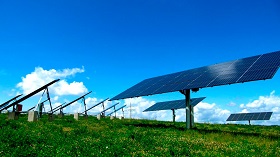The economic crisis of 2008–2009 brought chaos to the global energy market, which resulted in an even more intense struggle for electrical power supply and energy resources between countries. Global competition, national and international interests, the North–South divide, and attempts to develop a dialogue between East and West were all magnified.
The modern world is characterized by change and development, which leads to a growth in global energy consumption, primarily on the part of developed countries and developing countries with rapidly growing economies.
The economic crisis of 2008–2009 brought chaos to the global energy market, which resulted in an even more intense struggle for electrical power supply and energy resources between countries. Global competition, national and international interests, the North–South divide, and attempts to develop a dialogue between East and West were all magnified.
It should be noted that serious political steps have been taken over the past year, with new international agreements signed and large-scale congresses, conferences and meetings held on energy issues and how to ensure security and the regional and global levels.
One such event is the World Energy Forum, which takes place in Madrid on December 9–11, 2014 and is designed to become a platform for constructive dialogue between high-level government leaders, the expert community and industry representatives.
The significance and scale of the Forum are attested by the fact that it will be attended by heads of state, spokespeople, delegates and industry leaders from 200 countries. Its aim is to provide participants with the most up-to-date information on the state of the oil and gas industry and its pricing policy, analyse current trends and possible scenarios for the development of hydrocarbon transportation projects, examine issues related to energy conservation and efficiency, and identify new areas in energy security policy in current conditions.
The official opening of the World Energy Forum will be followed on the next day by a series of discussions and scientific and practical round table meetings on topical issues in the energy industry. This schedule will allow participants to establish new contacts and hold negotiations in a comfortable business atmosphere.
The 2014 programme will touch upon the most pressing issues in the energy sector, namely the current state of the industry, import and export, and the resource and geostrategic potential of countries. It will also consider new scenarios for key energy projects, including their financing and investment. Special attention will be paid to the topics of contemporary threats to the energy industry and regional energy issues. These constructive dialogues are intended to produce new ideas for solving these issues quickly and effectively.
It is also possible that all aspects of energy security will be discussed at the Forum – environmental, financial, socioeconomic and military-political. A number of expert reports and presentations will focus on energy efficiency and sustainable development policies, which involve energy conservation and the rational use of energy, regular monitoring and information exchange, attracting new investments into the energy sector, carrying out new exploratory work, and new methods for stimulating the economy.
The issue of modernizing the energy industry by developing and implementing new technologies and equipment while minimizing the risk to the environment will not escape the Forum’s agenda. Nor will human resources and the joint organization of training and retraining programmes for experts, scientists and professional staff in the energy industry. To be sure, this is likely to become a focal point for the signing of new contracts and agreements.
“Green Energy”, which takes a leading role in countries’ energy policies, will also be discussed at the Forum. Developing policies for diversification and the creation of new methods of transporting energy resources are key tasks for everyone involved in global energy. As Winston Churchill once said: “Safety and certainty in oil lie in variety and variety alone.”
The instability of the dollar in recent years, however, has led to a decrease in project dynamics and financing. Planned projects in energy conservation, renewable energy and the use of recycled materials to save energy require investment and further development.
We can thus conclude that the world is in need of changes and reforms that will “breathe new life” into the regulation of energy policy. Hopes are high that experts at the World Energy Forum will come to a consensus and formulate new ideas and suggestions to fill the gaps in the regulatory framework of energy policy and diplomacy, and that the signing of contracts and agreements aimed at furthering international dialogue and strengthening cooperation will lead to modernization and progress in the energy sector.





